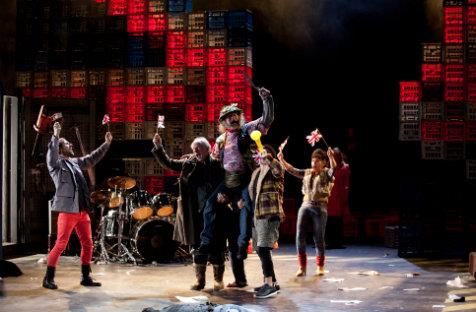In Henry 4, directors John Bell and Damien Ryan have come up with a compressed version of two already lengthy works of William Shakespeare: Henry IV Part 1 and Henry IV Part 2. By means of judicious cutting, re-arranging and in places, adding lines of dialogue, Bell has invented a version that tells the same story in brief – if, indeed, an evening’s entertainment of over three hours duration can be said to be brief!
The emphasis is on the comedic aspect resulting from the antics of young Prince Hal’s lowlife friends. The political points are also made, however, and we get a pretty good idea of the story by the time the play is finished, even though Henry’s gaining of the throne and a lot of the rebellious action that typified his reign are absent: only the Percy/Douglas campaign is shown.
However, this is not a cut-and-paste Shakespeare for the masses. Rather, it is a carefully planned and skilfully executed adaptation that seeks to show us something about the world that is as true today as ever it was in Shakespeare’s time. What we get is a consideration of the causes of unrest in society, and a study of father-son relationships. What happens when the son of a powerful father seeks a more accessible father image in the person of a well-born man who has deliberately chosen to live as a drunken layabout?
Bell and Ryan chose to present the play as a kind of modern steampunk tale. King Henry IV’s courtiers are modern politicians and businessmen, the crowds celebrating victory over the Percy/Douglas rebels are English soccer fans in all their hooligan glory. Yet anachronisms such as sword fighting are drawn up from the past like fish in a net, and served to us so convincingly that we do not notice that they are out of place.
Steampunk’s emphasis on the lower orders of society is well and truly apparent, but unlike Victoriana-style steampunk characters, these are not presented as worthy of redemption. Rather, we shudder at the thought of a young man of good family being decadent enough to hang out with these rogues, and those rioting football fans are probably irredeemable in any case! And make no mistake, John Bell’s Sir John Falstaff, indubitably the main character, is a reprobate of the first water. He is, we might think, fond of Hal, but he misses no opportunity to profit from the acquaintance. Full of bluster, he is used to lying his way out of almost any situation.
But Hal, who has no doubt seen a good deal of lying and sycophancy from his father’s courtiers, is never altogether fooled, and at the end of the play he banishes Falstaff. Even so, the old finagler tries to make himself and his companions believe that he can worm his way back into the prince’s affections. He is a man who simply cannot see his own shortcomings, or anything else other than the immediate opportunity for gain at whatever cost. Nevertheless, we cannot help feeling a sneaking sympathy for him: he has made us laugh, and made us squirm as well, because we all have a bit of Falstaff in us.
Bell is a man of mature years, yet he is onstage for much of the lengthy production, fighting, falling, and engaging in all kinds of physical business. How he does this for anything up to eight performances a week is almost beyond comprehension. It is, perhaps, his crowning role, demonstrating what a lifetime in theatre has taught him.
Without John Bell, I suspect this play would not be nearly so successful. The other actors are competent — Matthew Moore as the young Hal and David Whitney as King Henry IV are particularly convincing, especially in the first half, and the women’s roles were capably filled by Wendy Strehow and Matilda Ridgeway. But the play itself is over-long, and the second half seemed to drag, relieved only by highlights such as Ridgeway’s rendition of Mistress Quickly’s amusingly garbled speeches. It did not allow enough time for young Hal’s transformation into a heroic king to be believable.
The costumes are clever, full of little touches that reference modern life and people we know. For example, Kate, the wife of Harry Hotspur, wears at one point a very ‘Kate Middleton’ outfit.
This is an Australian Henry 4. The actors, for the most part, speak with Aussie accents, and we see those Pommy football fans through Australian eyes. The directors have not been frightened to throw in modern slang and obscenities here and there. All in all, it should be utterly unbelievable. Yet somehow the whole thing hangs together. It is not a historical play: one might even see it as a modern morality play. It is timeless in its message, and despite its slow second half and unconvincing denouement, it is well worth the price of admission.
Rating: 4 stars out of 5
Bell Shakespeare presents
Henry 4
by William Shakespeare, adapted by John Bell
Directors: John Bell and Damien Ryan
Composer: Kelly Ryall
Designer: Stephen Curtis
Lighting: Matt Scott
Fight Director: Scott Witt
Text Captain: Tony Llewellyn-Jones
State Theatre of WA, Heath Ledger Theatre
5 – 13 April





